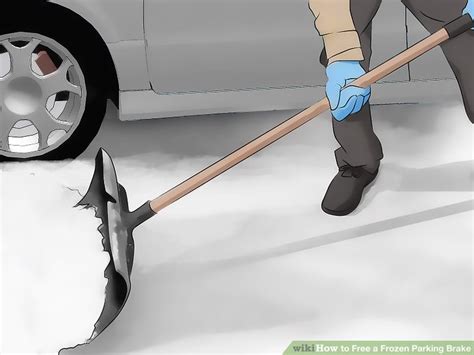Winter Car Care: How to Tell if Your Parking Brake is Frozen
Winter's icy grip can wreak havoc on your car, and one often-overlooked problem is a frozen parking brake. This seemingly minor issue can quickly escalate into a major inconvenience, leaving you stranded and frustrated. Knowing how to identify a frozen parking brake is crucial for preventing this frustrating situation. This article will guide you through the telltale signs and offer practical solutions.
What Causes a Frozen Parking Brake?
Before diving into the signs, let's understand the root cause. Moisture is the primary culprit. Water, snow, or slush can seep into the parking brake mechanism, particularly in older vehicles or those with less robust brake systems. When temperatures plummet, this moisture freezes, effectively locking the brake mechanism. This is more common with drum brakes than disc brakes, as drum brakes are more enclosed and thus retain moisture more readily. The use of the parking brake on a slightly damp surface can also contribute to freezing.
How to Tell if Your Parking Brake is Frozen: The Key Signs
Several indicators suggest your parking brake might be frozen. Pay close attention to these:
1. Inability to Release the Parking Brake
The most obvious sign is the inability to release the parking brake. You'll feel significant resistance when trying to disengage it, or the lever might not move at all. This is the clearest indication that ice has formed within the brake mechanism.
2. Unusual Sounds When Attempting to Release
Listen carefully as you try to release the brake. Grinding, scraping, or squealing noises can indicate that the brake components are frozen and grinding against each other. This warrants immediate attention.
3. Vehicle Won't Move
If you've attempted to disengage the parking brake and your vehicle refuses to move, even when the transmission is in drive or reverse, a frozen parking brake is a strong possibility. Don't force it – this could cause further damage.
4. Brake Light Remains Illuminated
A continuously illuminated brake light, even after you've released the parking brake lever, is another indication of a potential problem. The light often reflects a sensor detecting brake system pressure, which can be affected by a frozen brake.
What to Do if Your Parking Brake is Frozen
If you suspect your parking brake is frozen, avoid forceful attempts to disengage it. This could cause damage to your brake system. Instead, try these steps:
1. Let the Car Warm Up
The most straightforward solution is often to let your car warm up. The engine's heat will slowly melt the ice. This might take some time, depending on the severity of the freeze and the ambient temperature. Let the car run with the heater on (this circulates heat throughout the car, potentially helping thaw the brakes).
2. Use De-Icer
If warming up isn't sufficient, you can carefully apply de-icer spray (designed for automotive use) around the parking brake mechanism. However, be cautious not to spray it directly onto brake pads or rotors, as it could affect braking performance.
3. Gently Rock the Car
Once the car has warmed up slightly, you can attempt to gently rock the car back and forth to loosen the frozen components. Start with slight movements and avoid excessive force.
4. Call a Professional
If all else fails, it's best to contact a roadside assistance service or a mechanic. They have the tools and expertise to safely disengage the frozen parking brake and address any underlying issues.
Prevention is Key: Avoiding a Frozen Parking Brake
Taking preventative measures is the best way to avoid a frozen parking brake altogether. Consider these tips:
- Avoid using the parking brake on icy or snowy surfaces whenever possible. If parking on a slope, use wheel chocks instead to secure the vehicle.
- In extremely cold climates, consider using a parking brake that's less prone to freezing. Consult a mechanic or an automotive expert about options.
- Apply a light coating of silicone-based lubricant to the parking brake cable in the fall. This can help prevent moisture from sticking. (Consult your vehicle's manual before doing this)
- Regularly inspect the parking brake system for signs of wear and tear. Early identification of potential issues can prevent more significant problems.
By understanding the signs of a frozen parking brake and taking proactive steps, you can avoid a potentially frustrating and dangerous situation and keep your winter travels safe and smooth. Remember, safety is paramount, so don't hesitate to call for professional help if you are struggling to resolve the issue yourself.

